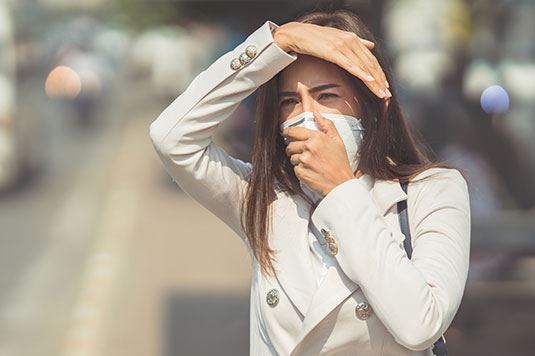
Open Accessibility Menu
Hide
dfh
Close Alert
Close Alert
How to Protect Your Lungs from Wildfires
Author: Sherry Harrington, RCP

While wildfires have always been a natural part of life in California, the ones we’ve seen in recent years have been some of the deadliest and most destructive. Drought conditions and population growth in areas prone to fire, have added to the fire danger. To complicate things, ample kindling and hot, dry Santa Ana winds in the South and Diablo Winds in the North, mean these fires move faster and are more intense, making them harder to control.
Apart from the obvious danger fire poses to people and property, the smoke fires produce can affect the air quality and cause serious breathing complications across the state. As we saw with last year’s Camp Fire, the air was thick with smoke for weeks here in the Bay Area even though the fire started in Butte County some 150 miles away. More than just an inconvenience, it was directly responsible for the increase in hospital admissions for respiratory conditions that we saw here at Washington Hospital.
Wildfire smoke is a harmful mixture of carbon dioxide, water vapor, carbon monoxide, nitrogen oxides, particulates, hydrocarbons and other organic chemicals. These airborne particles are easily inhaled, irritating sensitive tissues deep in the lungs. This can cause a variety of respiratory symptoms, including persistent coughing, wheezing, phlegm production and difficulty breathing.
Those with existing heart or lung conditions like asthma or COPD, as well as children, pregnant women and elderly individuals are most at risk for experiencing serious complications due to smoke inhalation. However, there are things you can do to protect yourself.
Conditions can change rapidly and often. That’s why it’s important to check local air quality alerts before leaving the house. We recommend AirNow.gov as a resource for air quality reports across the U.S., as well as parts of Canada and Mexico. Using data from the U.S. Environmental Protection Agency (EPA), the National Oceanic and Atmospheric Administration (NOAA), National Park Service (NPA), and a variety of tribal, state and local agencies, it offers accurate real-time local and national Air Quality Index (AQI) information.
Ensuring your health and safety is the most important part of any emergency plan. It is essential to monitor the progress of nearby wildfires and know your community’s evacuation plan. It is also important to have emergency supplies on hand before a wildfire affects your area; such as respirator masks, inhalers and medications. This will prevent you from having to hunt down these supplies when the air quality is at its worst and supplies are limited. During the Camp Fire, N95 masks were quickly sold out and became unavailable. This left many people without adequate protection.
It’s important to understand that not every mask is capable of filtering out the particulates that are lingering in the air. The masks you use to reduce the spread of the flu or the ones you pick up at the hardware store for a home improvement project will not adequately protect you from smoke exposure. For your protection, we recommend a N95 or P100 respirator filter mask. Prolonged exposure combined with the humidity of your breath will limit its filtering effects after a few hours.
Staying indoors with windows, doors and chimney dampers closed is the best way to limit your exposure to wildfire smoke. In fact, we advise our patients to limit all outdoor activities when air quality is at its worst. Even with a respirator mask, common tasks like going grocery shopping or gardening can unnecessarily put your lungs at risk.
The air quality has you stuck indoors, so you’ll want to make sure your air quality is as clean as it can be. Activities like vacuuming, dusting or even burning candles can kick up allergens and irritants that can reduce the air quality within your home. It’s important to keep yourself safe – and that means limiting activities and exposure to irritants that put undue stress on your lungs.
Wildfire Smoke and Your Lungs: Do You Need to Worry?
Posted: November 2019